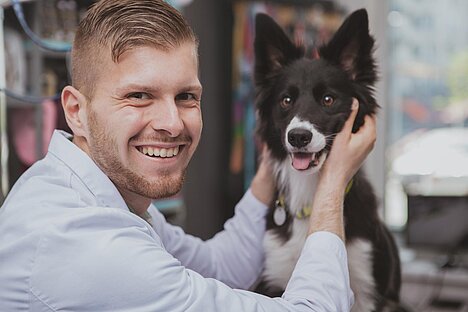Bloated belly

A bloated belly in dogs can be a sign of a serious condition that requires immediate veterinary attention. In this blog post you will learn about the causes, symptoms and treatment options for a bloated belly in dogs.
What is a bloated stomach in dogs?
A bloated stomach in dogs, also known as gastric torsion or gastric overload, is a life-threatening condition in which the stomach fills with gas or food and rotates on its own axis. This causes the blood vessels and esophagus to become constricted, which can lead to shock and organ failure.
What are the causes of a bloated stomach in dogs?
The exact causes of a bloated belly in dogs are not known, but there are some factors that can increase the risk. These include:
- Eating too much or too quickly
- Swallowing air while eating or drinking
- Eating food that is difficult to digest
- Drinking carbonated beverages
- Engaging in physical activity shortly after eating
- The presence of stress or anxiety
- The vomiting or belching of gas
- The presence of a genetic predisposition or an anatomical anomaly
What are the symptoms of a bloated belly in dogs?
A distended abdomen in dogs is a medical emergency that requires immediate action. Symptoms can develop and worsen quickly. The most common symptoms include:
- A hard, swollen and painful abdomen
- A restless, anxious or depressed attitude
- A reduced or absent appetite
- A reduced or absent thirst
- Reduced or absent urine output
- Reduced or absent defecation
- Increased pulse and respiratory rate
- Bluish or pale gums
- Excessive salivation or foaming at the mouth
- An attempt to vomit or regurgitate without success
- A collapse or unconsciousness
How is a bloated belly treated in dogs?
A distended abdomen in dogs requires immediate veterinary treatment to relieve the stomach and restore blood circulation. Treatment may include the following:
- A feeding tube to remove the gas or food from the stomach
- Gastric surgery to return the stomach to its normal position and fix it in place
- Fluid and oxygen therapy to combat the state of shock
- Pain medication and antibiotic therapy to reduce inflammation and infection
- Monitoring of vital functions and blood values
How can you prevent a bloated belly in dogs?
A bloated belly in dogs cannot always be prevented, but there are some measures that can reduce the risk. These include:
- Feeding several small meals throughout the day
- Avoiding eating too much or too quickly
- Avoiding foods that are difficult to digest
- Avoiding carbonated drinks
- Offering fresh water in a shallow bowl
- Avoiding physical activity shortly after eating
- Reducing stress or anxiety
- Spaying or neutering dogs that are not intended for breeding
- Regularly examining dogs that tend to have a bloated stomach
A bloated belly in dogs is a serious and potentially fatal condition that requires rapid veterinary intervention. If you notice signs of a bloated belly in your dog, don't hesitate to take him to the vet. With a timely diagnosis and treatment, you can increase your dog's chances of survival and improve their quality of life.
The authors assume that a veterinarian should be consulted if an animal is ill and that medication should only be taken after consultation with a doctor or pharmacist. Only an individual examination can lead to a diagnosis and treatment decision.
We help you find the nearest vet → This way